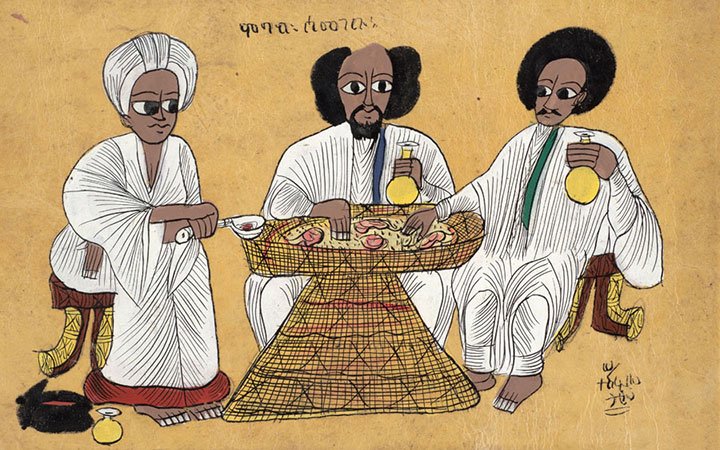
It's one of the oldest states on the Black Continent and it's the one which has stayed independent for the duration of almost all of its history (short of the brief period from 1936 to 1941). Ethiopia had long lived under the umbrella of so many different cultures, religions and ideologies. It used to be one of the closest allies of USSR in Africa. Today Ethiopia is the largest Christian country in Africa.
It's also one the World's fastest growing economies. Still, Ethiopia is one of the poorest countries on Earth. From almost 100 million people living today in Ethiopia more than 25 million is under the poverty line. Agriculture is the major source of income for almost 80% of country's population. Coffee beans is the main locally grown crop. As in the ancient past, a major drought is still capable to cause a sudden famine outbreak in Ethiopia.
Ethiopian history goes back to the dawn of human civilization. 'Ethiopia' (which means 'burned face' in ancient Greek) is mentioned in 'Iliad' and 'Odyssey'. Egyptian Queen Hatshepsut organized the expedition to the Land of Punt (Egyptian name for Ethiopia) in XIV century B.C. Multiple generations of indigenous kings and queens ruled Ethiopian for hundreds of years. At March 1, 1896 Ethiopian army defeated Italy in the Battle of Adwa. In 1936 Benito Mussolini's infantry had entered Ethiopia, which, for a short time period, became a part of the fascist state (until Britain crushed Italy during the East African Campaign in 1941).
From 1970th to the beginning of 1990th, Ethiopia - officially, the socialist state - was heavily influenced by Soviet Union's "anti-imperialist" politics in the region. In 1990th Ethiopian Marxist-Leninist experiment had resulted in the economic collapse, which was followed by the wide-spread social unrests. As the Soviet state disintegrated, Ethiopia transitioned to the new, democratic political system. However, Ethiopian People's Revolutionary Democratic Front (EPRDF) has been overwhelmingly dominant on the local political arena for all those years. There are no opposition parties' members in the country's parliament - the House of People's Representatives. Currently, every single one of 547 seats in the House belongs to EPRDF or its allies.
Even now all of key Ethiopian industries such as telecommunications, retail, transport and finance remain under the strict government's control. The fastest developing industry in the country is gold mining.
Ethiopia is a white spot on the map of high-tech entrepreneurship. This country of more 100 million people had been self-isolated for a quarter of century from the information revolution. Technologically Ethiopia still lives in the XX century. For example, just recently, government owned telecommunication corporation of Ethiopia has publicly praised itself for making a nearest stationary telephone post available for every citizens in a radius of 5 km.
Only a few years ago you had to obtain a government authorization to purchase a smart-phone. You also couldn't take them into Ethiopia without special permission. Although today those regulations are already a history, mobile devices usage is still reduced to 15% of population. The Internet penetration rate in this more than one-millions-square-kilometers country is under 4%. All communication traffics there are closely monitored by authorities.
Registering and running a private enterprise in Ethiopia is a very difficult endeavor, to say the least. With no credit cards or mobile payments available, monetizing Internet company is a formidable obstacle to overcame.
Although the local rate of economic expansion is one of the highest in Africa (almost 10% yearly), this growth has been achieved by a rapid deployment of large international corporations' businesses in manufacturing and mineral extraction industries, which is done almost exclusively in a form of join ventures with government's led corporations.
On a positive side, Ethiopia remains, potentially, one of the few almost unexplored markets left for high-tech startups founders in the World.
After years of isolation an Ethiopian romance with the digital economy, as with many other fledgling technological sectors, is still in the future. In May 2018 Ethiopian Ministry of Science and Technology's chief announced a partnership with one of the world's major crypto-currencies issuer. However, as far as the Ministry is concerned the block-chain technology must be all about monitoring coffee transit in and out of the country. Officially, crypto-currencies are absent in Ethiopia.
Unlike many of its African counterparts the National Bank of Ethiopia completely disregards existence of this new form of money. Same does the Ethiopian Revenues and Customs Authority, which is responsible for collecting domestic taxes and custom duties. Because Ethiopia is the largest country in the world without a stock exchange there's, of course, no SEC equivalent existing in Ethiopia.
The only exchange officially recognized in the country is the Ethiopia Commodity Exchange (ECX), which was launched by the group of enthusiasts in 2008 and which trades only on five basic agricultural produces - coffee, sesame, beans, wheat and maize. So far local crypto-enthusiasts (if there are any) have been left completely to their own devices, which is, given the excessive level of control presently exercised by Ethiopian government over all other economical and social sectors, may be not such an undesirable outcome after all.
Business Notes for Startups Founders:
political climate: hostile;
economic climate: not friendly;
regions to focus: locally;
industries to focus: e-services;
major limitations: government politics, prohibitive legislation, absence of basic telecommunication infrastructure, very poor population, no seed or VC financing available;
stimulus: absence of competition, lot of open market opportunities.
opportunities: many;
Cryptocurrencies and ICOs (outlook): not regulated (negative).
The author: Svyatoslav (Svet) Sedov
Angel investor and founder of The First International Incubator for Silicon Valley Companies (FirstInternational.In) in the Bay Area, CA, USA.
Twitter: https://twitter.com/SvjatoslavSedof